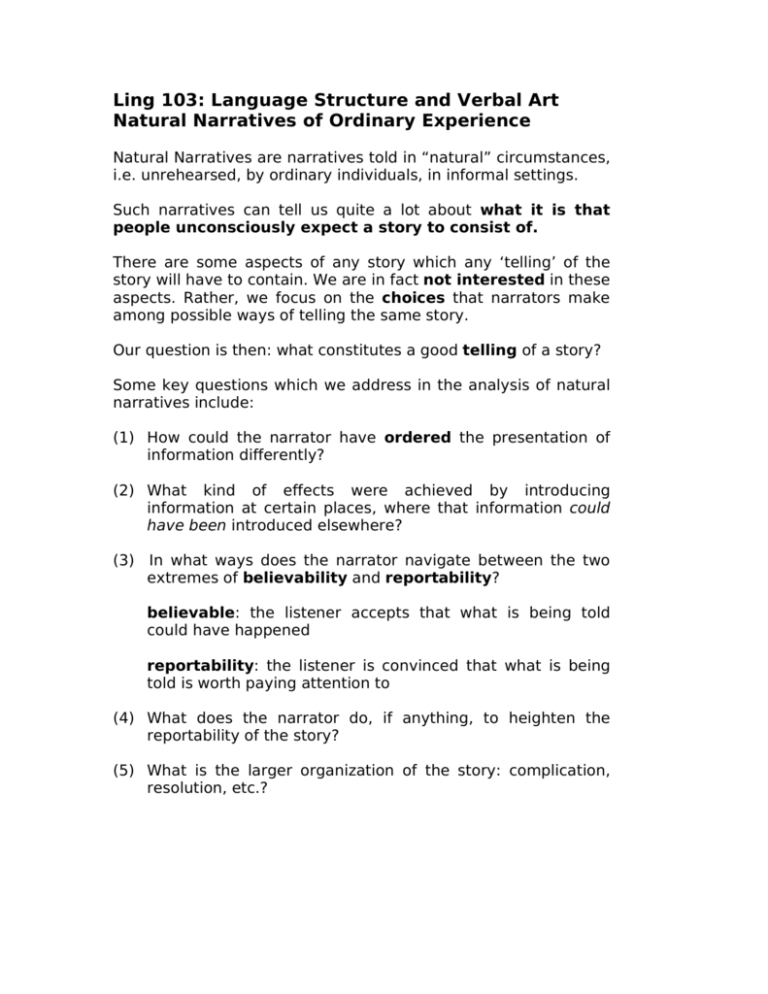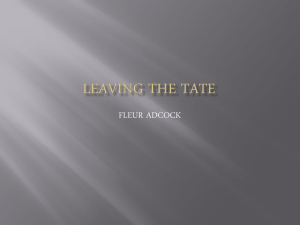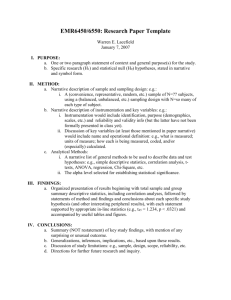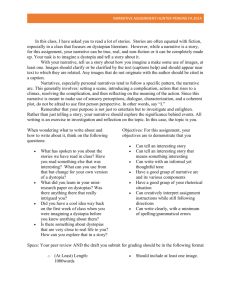Introduction to Natural Narrative
advertisement

Ling 103: Language Structure and Verbal Art Natural Narratives of Ordinary Experience Natural Narratives are narratives told in “natural” circumstances, i.e. unrehearsed, by ordinary individuals, in informal settings. Such narratives can tell us quite a lot about what it is that people unconsciously expect a story to consist of. There are some aspects of any story which any ‘telling’ of the story will have to contain. We are in fact not interested in these aspects. Rather, we focus on the choices that narrators make among possible ways of telling the same story. Our question is then: what constitutes a good telling of a story? Some key questions which we address in the analysis of natural narratives include: (1) How could the narrator have ordered the presentation of information differently? (2) What kind of effects were achieved by introducing information at certain places, where that information could have been introduced elsewhere? (3) In what ways does the narrator navigate between the two extremes of believability and reportability? believable: the listener accepts that what is being told could have happened reportability: the listener is convinced that what is being told is worth paying attention to (4) What does the narrator do, if anything, to heighten the reportability of the story? (5) What is the larger organization of the story: complication, resolution, etc.? 2 Larger constituents of narrative Most narratives have a macrostructure which consists of an orientation, complication, resolution and coda. Not all narratives have all four, and the dividing line between these parts is not always obvious. Moreover, a narrative may have more than one complicationresolution pair, and such pairs can even be embedded one inside of another. We can define the parts of the narrative in terms of the kind of information they impart to the listener as well as to the attitude they place the listener in. Orientation: orients the listener in respect to person, place, time and behavioral situation a b c This was back in the mid 70s It was my Mom’s birthday so we were going out to eat for dinner (time) (people, situation) (place, situation) Often the orientation includes a deictic element like ‘this’ which indicates anticipatorily the narrative that is to come. Complication/Complicating Action: main body of the narrative The complication normally begins as soon as the orientation material has been established. Effectively, at any point in the complication the listener maintains a tacit attitude: ‘So what happened? What’s next?’ Resolution: the end of the complication The resolution answers the ‘problem’ posed by the complication. It answers the listener’s question ‘What happened?’ After the resolution, the narrator normally moves the listener out of the ‘What happened next’ attitude. Instead the listener has the attitude: ‘So that is what happened.’ 3 Coda: returns the listener to the present The listener needs to be brought out of the narrated ‘world’ and back to the actual, present world. Often the narrative will framed with yet another deictic element, which distances the narrative from the present. So that was really scary. And that was that. So that’s how it all went down. And even now I get nervous when I think about it. Those were the days! Evaluation In order to make a narrative seem more reportable (worth listening to), narrators often introduce what are known as evaluative properties into the narrative. Evaluative properties — justify the relevance of the story — justify ‘why’ the story is being told — comment on the events as they occur, making it clear why they are notable — often involve exaggeration or self-aggrandizement by the narrator Depending on the inherent reportability of the story, the evaluation may be more or less important to a good telling. If the story is intrinsically interesting or relates extraordinary events, then the narrator may feel less pressure to introduce evaluation. If the story is generally considered commonplace, or if the narrator is insecure about the reportability of the story, then evaluation will almost certainly be included. 4 Evaluative techniques 1. semantically defined evaluation Here the evaluation is relatively explicit. a. direct statement: the narrator tells the listener something about the narrative or about the telling: And this is the part where it gets really strange. I can’t even describe how disgusting it was! It was so long ago, I can hardly remember what happened. What does the narrator hope to accomplish by saying any of these things? b. lexical intensification: use of exaggerated, informal or vulgar vocabulary: She was so fuckin’ drunk! It was totally freezing out that day ... Oh my God, I thought I would die right then and there. c. situational: the narrator describes an event or circumstance intended to emphasize how unusual the situation is: This was in the days before they had MRI. Then, I made the sign of the cross. No one had ever seen anything like it before. d. direct appeal to the listener Often, a narrator’s sense of insecurity about reportability is reflected through devices that ‘invite the listener’ into the narrative: You know what I mean? I’m sure everyone has had this experience. Can you imagine how I felt? 5 2. Structural evaluation The technique of suspension of action can be used to heighten listeners’ interest by delaying resolution. In a narrative a suspension of action can be achieved at least three ways 1. digression/further complication On the way to resolving the first complication ‘what happened’, the narrator can introduce a new complication, thus adding a new ‘what happened’ question before answering the first one. 2. narrative tempo slowed with stative clauses As we will see, in telling a story narrators alternate between two types of clauses: a. eventive clauses: these describe an event, a change in the world Edgar thumped Ricky. Then Ricky thumped Edgar back. Donna said, ‘Get out of my life, you creep!’ b. stative clauses: these describe a state-of-affairs that is true in the world during some interval of time. I was 13 years old. My mother never got home from work until 5. Everybody thought Edgar was a jerk. Donna had a crush on Ricky. A narrative can be said to have a certain tempo. Every new event that is introduced moves the time frame further along, as is like a new rhythmic ‘beat’. But stative clauses, because they do not introduce new events, do not contribute to moving the time frame; they provide no ‘beat’. 6 To slow down the narrative, stative clauses can be introduced. This frees the narrator from having to tell ‘what happened next.’ These stative clauses sometimes comment on the significance of the events that have occurred, but sometimes just provide background information. They are often evaluative. I remember, one day, Edgar and Ricky and Donna were standing in front of the school. [Listener thinks: OK ... there’s these three kids, they’re in front of the school, now what will happen to them? ] I don’t know why, but Edgar thumped Ricky in the face so hard he bled out of one eye. [Here the listener thinks, ‘Wow! what’s going to happen now?] Everybody thought Edgar was a jerk. [OK ... that’s pretty obvious ... what’s going to happen now? ] Donna had a crush on Ricky. [Right, OK, but ... what’s going to happen now? ] We were all 13 years old. [OK , OK, just tell me what’s going to happen now! ] My mother never got home from work until 5. [Um ... why is this relevant? What happened, what happened??] Then Ricky thumped Edgar back. [Ah, relief, now I know ... but, then what? ] 7 3. slowed narrative tempo through syntactic complexity The narrator can slow the tempo not only by introducing stative clauses, but also by making eventive clauses more syntactically complex. This is done by adding non-finite clauses, or clauses whose temporal interpretation depends on the main clause, and is not independent. And when Ricky came out, Edgar beat him, until he got tired. There are three clauses in this sentence: a. b. c. [when Ricky came out] [Edgar beat him] [until he got tired] Every clause contains a verb (came, beat, got tired). But only one clause is temporally independent: [Edgar beat him] The reason is because the times of the events in the other two clauses is dependent upon the time of the temporally independent clause. Some clauses express events which occur at a point in time. Others express events which take place over an interval. Yet others express states which are true during an interval. a. b. c. [Ricky came out] [Edgar beat him] [got tired] punctual activity over an interval punctual a b c • ------------------• Ricky comes out Edgar is beating Ricky Ricky gets tired The temporal conjunctions until and when entail that the the ‘come out’ event and the ‘get tired’ event occur in some relation to the ‘beating’ event-interval. Thus, there is only one temporal anchor for the whole sentence, even though the sentence has three clauses. 8 Compare: a The other car hit us head on. b I was knocked unconscious in the back seat. c My dad tied a makeshift bandage around my head. d I woke up. e I opened my eyes f. I saw blood everywhere. g. I closed my eyes again. h. My mother screamed. i. The ambulance came. j. They loaded me in. 10 temporal anchors fast tempo versus a. When the other car hit us head on, I was knocked unconscious in the back seat. b. After I woke up, I opened my eyes, noticing that my dad had tied a makeshift bandage around my head. c. Because blood was everywhere, I closed my eyes again while I heard my mother scream. d. As soon as the ambulance came they loaded me in. 4 temporal anchors moderate tempo 9 versus a. After the other car hit us head on, I was knocked unconscious in the back seat. b. I’d never been knocked unconscious before in my life. c. It’s a weird feeling. d. One minute you’re one place, at one time. e. The next minute, time has passed, but you didn’t even realize it. f. Well, I guess it’s like being asleep. g. Except, well, I’m not sure if you dream when you’re unconscious. h. Do you? i. Well, anyway, when I woke up, I opened my eyes, noticing that my dad had tied a makeshift bandage around my head. j. My dad was always excellent in an emergency situation. k. How he kept from getting killed, I’ll never know. j. And, because blood was everywhere and I was scared out of my fucking mind, I closed my eyes again while I heard my mother scream. l. Man, it was really scary. You know what I mean? m. As soon as the ambulance came, which took like forever, they loaded me in. 4 temporal anchors for narrative (describing the sequence of events). 9 clauses with purely evaluative function. Very slow tempo. clauses 10 Interview with Zach Shaw http://www.wethepeople.de/2003/news.php?nr=47 February 20, 2003 (Give me a random story from your past?) Once upon a time my good friend Shaun Scarfe was driving me back home. The drive was a long one and he was always a good story teller. His nickname was mouth. This trip was no exception and he proceeded to tell me some crazy story that was at least 2 hours in telling. About 1 hour and 45 minutes into the story Shaun stopped talking turned to me and said, “What did I just say?” Now I have to be honest I had been kinda ‘not’ listening after about an hour and had just been saying “yeah, yeah uhuh yeah”. Shaun repeated the question with some anger in his voice this time, “WHAT DID I JUST SAY!” He had got me! I had no idea what he had been talking about for the last hour and 45 minutes, so I tried to bluff it with a weak reply of “were you talking about those girls who er er?!?” As soon as I said this he freaked. “FUUUCK WHAT DID I SAY!!!!!!!! TELL ME OR I WILL KILL US BOTH!!!!!” he screamed at me while still driving the car. I was stunned “Er er er...I dunno I can't remember?” I replied. He then started shouting “I GONNA KILL US BOTH IF YOU DON'T REMEMBER!!!!” At that point he put his foot down and we slowly started to accelerate down the country lane we were on. “I’M GONNA KILL US BOTH!!” he screamed. “TELL ME!! TELL ME!! COME ON WE ARE GOING TO DIE UNLESS YOU REMEMBER!!” I was now getting scared as either side of us were trees off of the road and I couldn’t remember anything at that point what with the thought of my immanent death at the hands of my crazy friend who was driving like a loon because of my lapse in listening ability during this journey! He then stared swerving across the road screaming “TELL MEEEEEEEEEEE!” I shouted, “SHAUN I DON"T KNOW, FOR FUCK’S SAKE SLOW DOWN!” Shaun started screaming “AAAAAAARRRRGH” like it was the end, we were BOTH about to die. “AAAAAAARRRRGGGHHHHHHA HA HAHAHAHAHAHAHA.” Just at the point where I thought I was going to die, he started laughing and slowed down. Turns out he was tired and he thought he would wake himself up as well as me with the threat of a horrible vehicle wreck death. The stretch of road he put his foot down on he knew like the back of his hand. The moral of this story is don’t get in a car with Shaun Scarfe. He's a bastard … I nearly shit my pants! 11 World War II narrative. Interview with Phil Cohen Highland Park, Illinois, on May 25, 1999. http://home.insightbb.com/~j.dapena/cohen/interview.html One morning in August of 1944, our Commanding Officer, Major Don Beerbower, called a fighter-bomber mission to a German Air Force base in Belgium. I was on that mission. We had two bombs, one under each wing. Major Beerbower died. I dropped my two bombs, flew back up to 15,000 or 18,000 feet, and returned to A2. I jumped out of the plane at 10:30 to 11 o'clock in the morning. I told the Operations Officer that Major Beerbower had been shot. He said that he had heard that. He then told me that there would be another mission at 1 o'clock in the afternoon. I told him that I hadn't slept for 32 or 33 hours. The OP officer told me to go to sleep. There are supposed to be 33 pilots in a squadron, and at that time we had only 15 or 16 pilots left because all of the 17 backup pilots were dead or had been sent home. I slept till 2:30 in the afternoon. Then I found out that Captain Wallace Emmer had been named the CO, and that he also had been shot. He had been CO for two hours. Beerbower was from Minneapolis, MInnesota, and Emmer was from St. Louis, Missouri. I knew both of them. 12 Hiroshima bombing survivor narrative. Taeko Teramae tells of her experience when the atomic bomb was dropped on Hiroshima. http://www.inicom.com/hibakusha/taeko.html When the bomb fell, I was 15 years old. I was a third grader at the girls' junior high school. I saw something shining in the clear blue sky. I wondered what it was, so I stared at it. As the light grew bigger, the shining thing got bigger as well. And at the moment when I spoke to my friend, there was a flash, far brighter than one used for a camera. It exploded right in front of my eyes. There was a tremendous noise when all the buildings around me collapsed. I also heard people crying for help and for their mothers. I was caught under something which prevented me from moving freely. I was so shocked that I couldn't believe what had happened. I thought maybe I was having some kind of nightmare, but of course, I wasn't. I felt pain when I pinched myself to see if it was real. I thought the bomb had been dropped on the central telephone office. The dust was rising and something sandy and slimy entered my mouth. I couldn't figure out what it was since I couldn't move or see. I couldn't see anything in the dark. A little later, I smelt something like sulfur. It smelt like the volcano, Mt. Aso and I threw up. I heard more voices calling “Mother! Mother!” But when our class teacher, Mr. Wakita, told us to behave like good students and stop crying, all the cries for help and for Mother stopped all of a sudden. We began to calm down and try to behave as Mr. Wakita told us to. I tried very hard to move my arms and my legs and finally I was able to move a little. I was so surprised to see the dark sky with all the red flames through the window because it was only a few minutes before when the sky was blue and clear. It was all quiet and the city was wrapped, enveloped in red flames. Mr. Wakita came to help me. He asked me if I wanted to swim across the river. The bridge was burning and the river was very high. I had no choice. I could barely see by then, though. And Mr. Wakita took my arms and told me to swim across the river together with him, so together we went into the river and began to swim. When we reached the middle of the river, I could no longer see anything and I was starting to feel faint. And as I began to feel faint, I also began to lose control. Mr. Wakita encouraged me and helped me to reach the other side of the river. Finally, we reached the other side. What surprised me so much was that all the cries of the students for help 13 and for their mothers. It just didn't stop. I couldn't see anything. All I could do was listen to their cries. I asked my teacher, I asked him what was going on. Mr. Wakita explained to me how the high school students were burnt and crouching in pain in the streets. I couldn't see anything. There were many students who were mobilized to destroy buildings to widen the streets and the area of Tsurumi Bridge, City Hall and the Chugoku Newspaper on that day. And since they were outside, they were directly exposed to the bomb. Many of them died, many of them died right there. Someone called for help in vain, and some jumped into the river and drown to death. If my teacher, Mr. Wakita had not come to help me, I would have died in the river.







